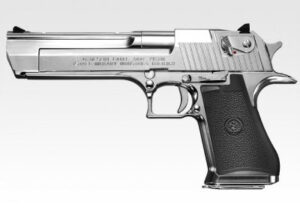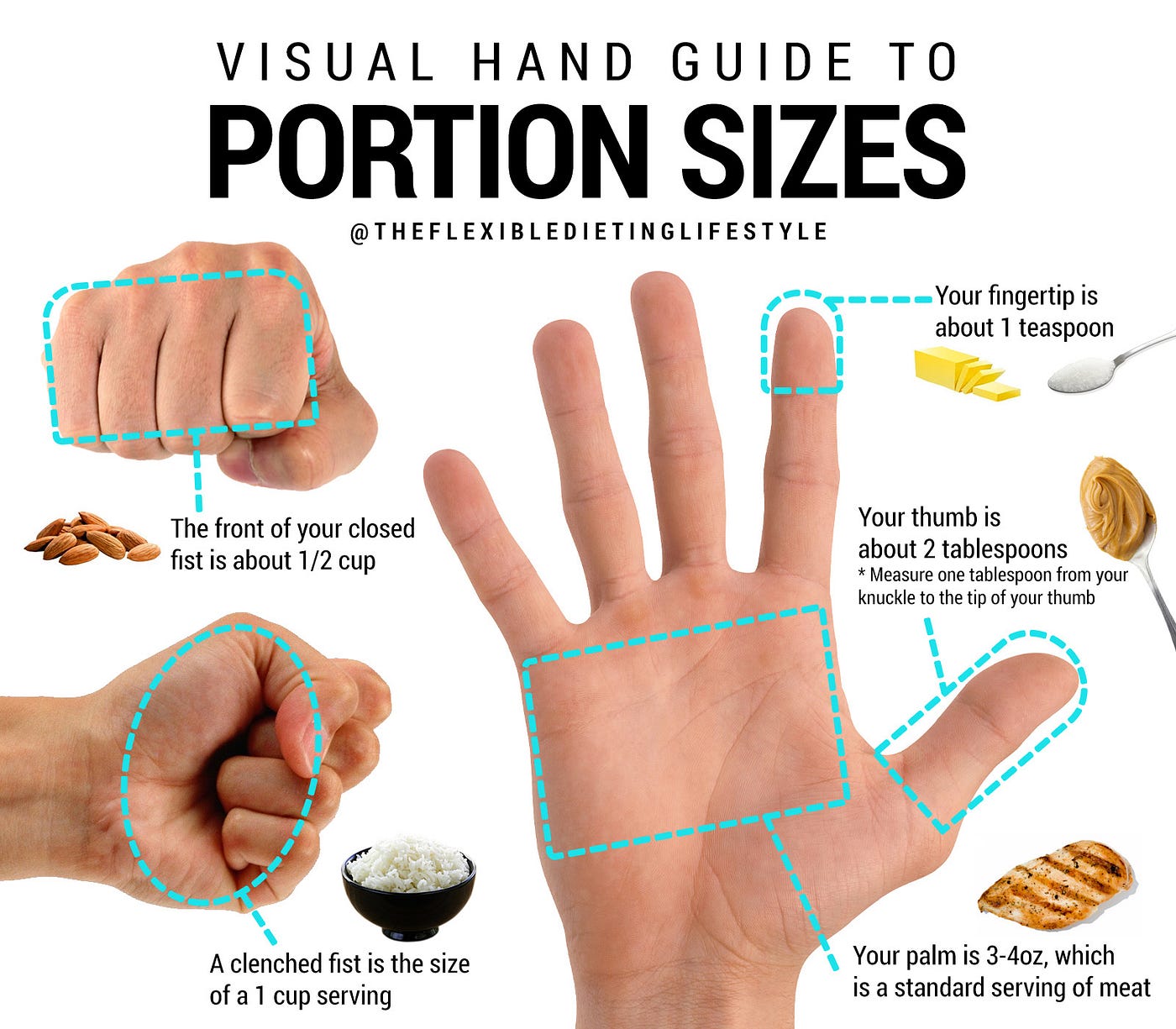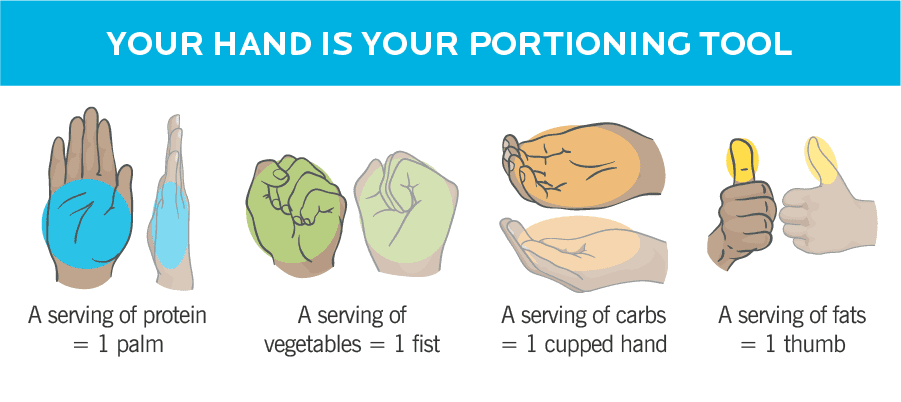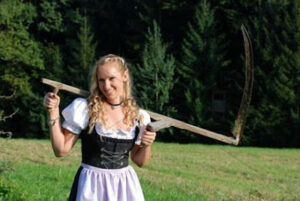The publication of my book on Survival Weapons gives me the excuse to diversify a bit more on this blog, as some readers have requested.
Today's post nicely covers the aspects of both survival and marital arts and I hope will be of interest.
It seems odd these days, but once information about ninja was hard to come by. One of the best sources was (and still is) Donn F. Draeger's Comprehensive Asian Fighting Arts.
In the discussion of the ninja Draeger mentions the “Six tools of Travelling” or Shinobi-rokugu (p.127). Six items that a ninja would never leave on a mission without.

Draeger’s descriptions of the items were not as clear as one might wish, however. Last night, while researching a quite different topic I was able to clarify a few things. Items 4 to 9 in the illustration below represent Shinobi-rokugu.

Amigasa. Amigash was a broad brimmed straw hat, the Japanese version of what is commonly called a coolie hat.
A hat is obviously good protection from the sun and the rain but for the ninja has the useful property that it can also conceal the face without the attempt being obvious.
A hat such as this can also be used as an improvised buckler to fend off an attack with a knife.
In the movies, such hats are sometimes thrown like frisbees. While this would not do the damage shown in such movies, it would be a useful distraction.
Below is a photo that is reproduced in a couple of my Japanese language books. I originally thought that the arrows shown here were either hand-thrown weapons or darts for a blowgun.
Hand missiles this size made predominately from wood and feather would be rather light, while such large fletchings on a blowpipe dart would be unnecessary and less than efficient. Possibly these arrows were a hybrid for both than throwing and blowgun.
I now see these are actually arrows intended for a bow and what was visible in my books was just the tail section of the arrow. Each extends across the width of the hat, the rest of the shaft in a pocket of some kind so it resembles a supporting rib.
Doubtless other weapons were concealed in the hats. Bo-shuriken could be placed radially like the arrows and this would be a good hiding place of a garrotte/spare bowstring.
The floppy hats favoured by 17th century cavalry such as the English Cavaliers often concealed a metal structure called a “Secret” to protect from blows and it is possible that some amigasa also had a metal cap or framework within.

Kaginawa. A rope with a hook. ninja were known for climbing so it is hardly surprising that this would be an essential item. A length of cordage is always useful anyway.
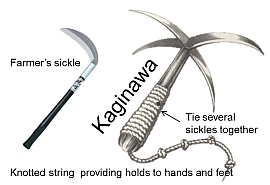
Tenugui. Draeger calls this a towel, which conjures the “Hitchhiker’s Guide to the Galaxy” to mind.
The tenugui is actually made from thin cloth and is better understood as resembling a bandanna of about three foot by one foot size.
Kendo fighters will know the tenugui as a headscarf to be worn under the helmet, but it was originally a multi-purpose item, used as a bandanna in the fields and a handcloth in the home.
It could also be used as a bandage or sling, or as a mask to protect from smoke or conceal the identity.
Sekihitsu. Draeger just calls this a “stone pencil”, which does not tell us much. In fact this was a portable writing kit ("Yatate"), which was not an uncommon item for feudal Japanese to carry on their person.
Ninja were spies as well as assassins and some means to record information and leave messages was essential to their task.
One of my Japanese language books shows this as something resembling Popeye’s pipe. The “bowl” is in fact an inkwell and the stem contains a brush. There is even a vent cut in the stem to allow the bristles to dry and air. Such kits could be used to conceal various weapons, and even the ink might be poisoned.
Even standard yatate were sturdy enough to be passable clubbing weapons. Underneath this item in the photo is what looks like pieces of pointed chalk. This may be either chalk or a slate pencil. Both would be useful and this may explain Draeger’s use of the term “stone pencil”.
Kusuri. Medicines. Ninja are known to have produced special pills intended to staving off the effects of thirst or hunger. Various salves, ointments and insect repellents might also have been carried.
Doubtless the ninja also carried a few poisons and hid them in plain sight within their medicine kit.
Carrying a few medicines on your person was by no means unusual in feudal Japan.
Shown in the photo is a typical Japanese medical kit (“inro”) which is rather neat. It has a number of small trays which act as compartments moving up and down the cords. The whole thing can be pulled together and hung from a belt. Quite practical and worth copying.


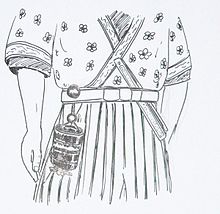
Uchitake. Draeger describes this as a short bamboo pole.
In Eric Van Lustbader’s novel “The Miko”, the uchitake isdescribed as a long bamboo pole that can be used as a walking staff. The other five Shinobi-rokugu items are packed into the pole, which can doubtless also be used as a fighting staff.
The sixth item of the rokugu is in fact a short tube of bamboo filled with gunpowder and is mainly intended for firelighting. Since the Shinobi-rokugu is intended as a basic survival kit some means of making fire would be needed and this makes much more sense.
Below is an illustration found in several of my books, but since I do not read Japanese I am little the wiser. The C-shaped item is obviously a striking steel but how the other items are used exactly I am unsure. The tube it is attached to resembles a flute, but has holes evenly spaced around it. Obviously this cannot be a container for gunpowder.
The lower item is apparently a charcoal/ char-cloth body warmer or donohi which could provide a ready source of ignition for lighting fuses, arson etc. Possibly the flute-like tube is the central part of the donohi around which the char-cloth is wrapped. This could be blown down to produce more heat when needed. A perforated tube could alternately be used to transport a lit slow-match.

Some of you may note something is conspicuous by its absence. There is no mention of a knife. It may have been considered redundant to tell a ninja to bring a knife. In feudal societies, most people carried a knife as a matter of routine, using it for all manner of everyday tasks.
Shinobi-rokugu in the Modern Day
A few months back I brought a new daysac. Once I had it I began to add a few useful things to it, and now that I think about it my choices did parallel the Shinobi-rokugu.
- One of the first things I added was a hat. In fact I added two. One is my much traveled broad-brimmed boonie hat. The second is a lightweight synthetic headover that can serve as a cold weather hat, neck warmer and so forth.
- I’ve not added a rope and grappling hook, but I did add a ball of string to provide useful cordage. Perhaps I should add a hank of paracord too.
- I put a bandanna in the bag too, and usually carry one in my pocket, so that is my Tenugui equivalent.
- Not yet added, but when travelling my daysac usually carries a notepad and spare pen in a plastic bag. Perhaps I should consider some chalk.
- Medicines. I will be adding a few aspirin, plasters and dicholorfenic. When I travel with this bag a bottle of insect repellent and sunscreen will doubtless be added.
- My fire kit is a spare disposable lighter and a couple of nightlight candles. The latter can be used to get a fire going and can also be used for illumination.
For completeness, other items added to the daysac included an All-Weather Blanket, “pak-a-mac”, lever-powered torch, pair of woollen gloves and my Platypus Water Bottle.













